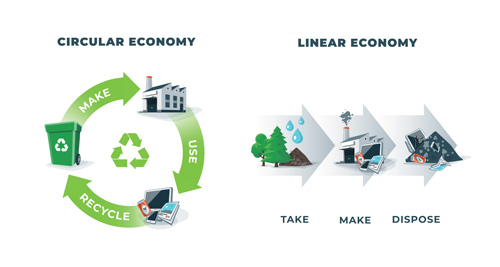By Robert Ferguson, LGAQ Lead - Public Health and Waste
China waste restrictions, loss of markets, and now the imminent introduction of waste export bans places the waste and resource recovery industry in constant flux with considerable pressure on the day to day operations of council waste management and resource recovery services. Being realistic, constant change is the new norm at least in the foreseeable future and as such we all need to find ways to respond to these challenges.
With a waste levy, waste strategy, plastic bag ban, container refund scheme already in place and an energy from waste policy, single-use plastics ban and an organics plan in the pipeline, it is fair to deduce that Queensland has been rapidly playing catchup over the past couple of years and is now on par or leading the way on several key agendas. Queensland has progressed to a stage where there is now greater policy direction and certainty than there has been for more than a decade.
In addition to the agendas currently being progressed, it would not be overly pessimistic to expect that landfill bans will be a lever deployed for key waste streams at some time in the future, making diversion from landfills a very topical discussion for all councils and not just waste levy councils.
Through this change, councils have continued to deliver kerbside red and yellow bin services across Queensland. Many councils have been devastated by loss of commodity prices for key recycled content and where they were once receiving payments for their recyclables, they are now being forced to pay gate fees in addition to the already considerable transport costs for regional councils to simply continue to do the right thing. The goodwill of councils can only go so far and the community is watching!
Do we unravel all the years of recycling messages or do councils show leadership and take it to the next level – a new direction? Do we sit back and bury our heads in landfills or try to make a difference and embrace a new approach away from our linear waste management practices and the way we traditionally think about waste and recycling moving towards a circular economy and what it can mean for all councils?
It is now great timing for a rethink. 2020 brings more change with new elected members and the potential to embark on a journey knowing that as councils you will have a full election cycle to take on the circular economy challenge and see what you can really achieve at a local and regional level by focusing on the things you can control.
It would be naive for councils not to think ahead. For the 39 councils in the waste levy zone currently receiving almost $150 million in advance payments the challenge becomes very real and we must ask ourselves what happens if we do not secure the ongoing payment of these funds beyond the initial three year commitment. Diverting 1.84 million tonnes of MSW from landfill may have much greater significance and relevance for councils beyond 2022.
It is therefore timely to take a look at embracing local and regional opportunities, whether it be our community education and messaging for reducing contamination in yellow lid bins, the use of recycled glass in roads, the shredding and crumbing of tyres, approaches to composting and organics, responding to metal waste, mattresses, e-waste, PV panels, or finding markets for agricultural plastics and trickle tape. These all provide opportunities for a systems approach to managing waste away from the traditional linear response to waste management and building on a circular economy journey for councils.

With a State election looming later in 2020 brings opportunities. A chance to take a good look through the lens at the various policies and level of support for councils and see what meaningful waste and recycling possibilities are on offer to local government. It is not solely about big-ticket, ribbon-cutting projects but giving the much-needed investment and leg up for councils for improvements to existing infrastructure including material recovery facilities. Councils acknowledge that we need large scale investment of regional and statewide significance including solutions for mixed plastic processing and tyre crumbing facilities but we also need to invest in a range of upgrades to existing facilities across various regions. Councils cannot continue to do all the heavy lifting. Commonwealth and State government funding for resource recovery infrastructure improvements and upgrades must be forthcoming.
Travelling across Queensland I can attest that we have some pretty switched on waste managers working for local government and it is with confidence I can say that they are more than capable thinking outside of our traditional approaches to waste management and moving towards a circular economy future.
Queensland councils continue to work on a range of strategic partnerships investigating various approaches to their waste and resource recovery challenges. Whether it is Cairns Regional Council building a new material recovery facility, NQROC with its community education and awareness ‘Recycle right – keep it simple’ campaign or WBBROC working on a regional partnership investigating long term waste management solutions, the message is clear, we have many councils with genuine skin in the game seeking to find sustainable long term solutions for waste management and resource recovery and its not centred on everything going to landfill but a broader more holistic approach towards a circular economy future. Is your council up for the challenge?